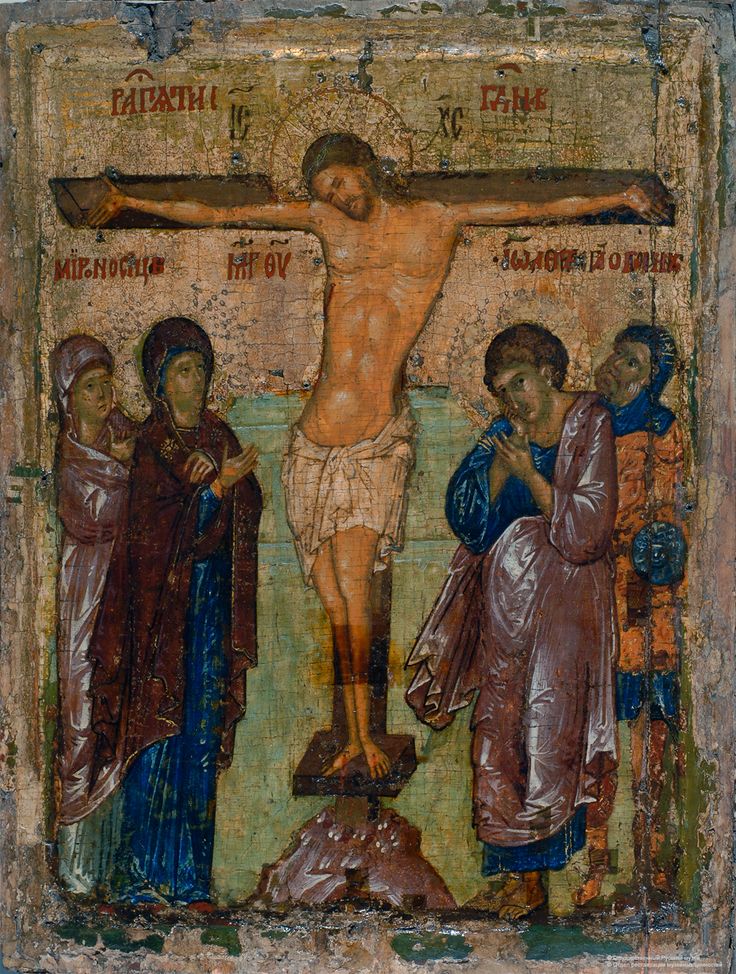Great and Holy Saturday – Metropolitan of Strumica, Nahum
~+~
The behaviour of the Most Holy Theotokos, as well as the Myrrh-bearing women and the beloved disciple – John, before the crucified Christ – on Golgotha, raises the question of proper Christian behaviour before the suffering and death of our loved ones.
But let us start from the beginning.
Did Christ transgress against anyone or anything so as to suffer so terribly? We know that the answer is – no; Christ is the only sinless One, and He suffered for the salvation of us sinners. What was the role of the contemporary authority in His suffering and death? The authority is the executor, by inaction and by action; Pilate washed his hands, that is, he justified himself, and, the soldiers crucified Him. What was the role of the contemporary priesthood? Slanderous and inciting; they are the main culprits for Christ’s suffering and death. What was the behaviour of His disciples? Cowardly; and one of them betrayed Him. What was the behaviour of the majority of the people? Extremely irresponsible and fickle; People care only for some kind of sensation, entertainment, theatre – first they welcome Him in glory, then they demand that He be crucified instead of someone who happened to be a popular thief, and finally – they pretend to have pity on Him.
Let us now return to the behaviour of the Mother of God and the other disciples. Were their souls saddened to death by the terrible loss? Certainly; and especially the sorrow and pain of the Mother of God is incomparable to the depth and breadth of anyone’s sorrow and pain. Did they somehow show this publicly? No. Did they testify, by their presence – unlike those who were afraid and fled, that they themselves would rather suffer death instead of Him? Obviously yes.
Other questions arise. Did they reproach and blaspheme God and the Father for Christ’s suffering, or were they also grateful to Him for it, remaining unwaveringly faithful to His Providence for the salvation of all? Did they also blame some of the other participants in this event? Did they blame the authorities? Did they blame the priesthood? Or the faceless masses of people? Or the disciples who abandoned Him? Did they blame Judas who betrayed Him? Did they wish them any evil? Were they seeking human justice? Were they self-justifying? We do not see any of that usual human, psychological behaviour – without faith; because one behaves in one way when they think they are losing someone forever, and in another way when they know they are losing someone temporarily. Thus, they behave as every true Christian should behave: whatever happens to him in life, no matter how bad it is – he accepts it as a gift from God, gives thanks to God for it, sees the blame for anything only in himself, does not show outwardly that something is happening to him and continues with his prayer to God – not to cause a change in what is happening, or for God to punish those who caused him evil, but to strengthen his union with God, as well as for God to have mercy on his enemies.
He leaves any and all justice to God’s mercy and unavoidably – to the secular authorities. This is the only true Christian spiritual behaviour by which we do not betray our loved ones even after their death; because only such a pious behaviour of ours makes up for any shortcomings in the salvation of our loved ones and God accepts it as our sacrifice as a substitute of what they lack.
This is pious behaviour, according to the Orthodox faith, by which we draw God’s uncreated grace and light to ourselves and to our loved ones – living and deceased; and we help them in their salvation.
Lord, through the prayers of Your Most Holy Mother, forgive us and have mercy on us all; Amen!
Metropolitan of Strumica, Nahum
19 / 04 / 2025

